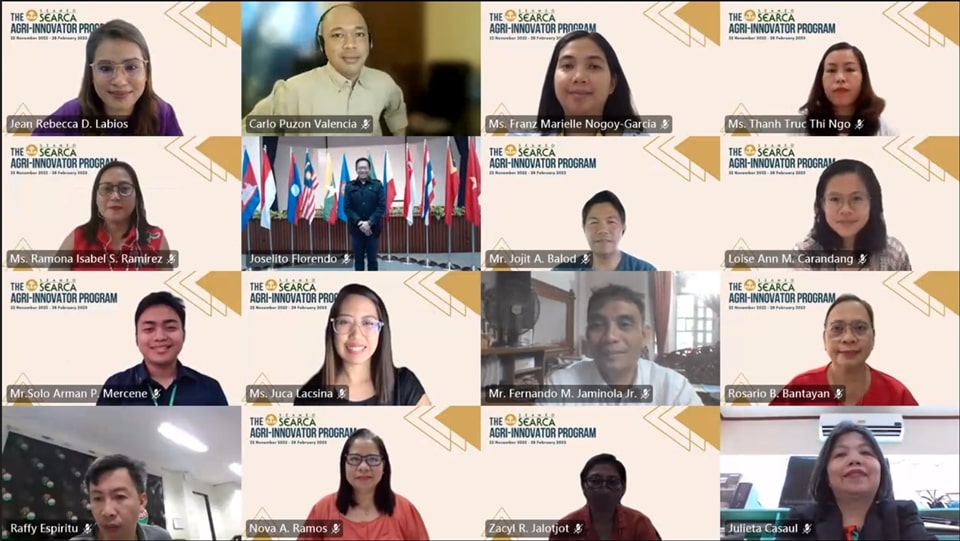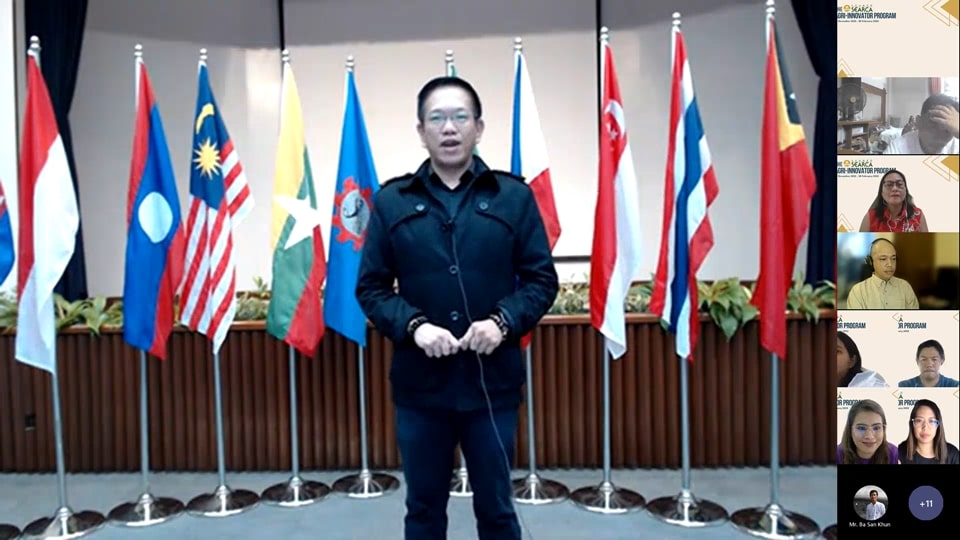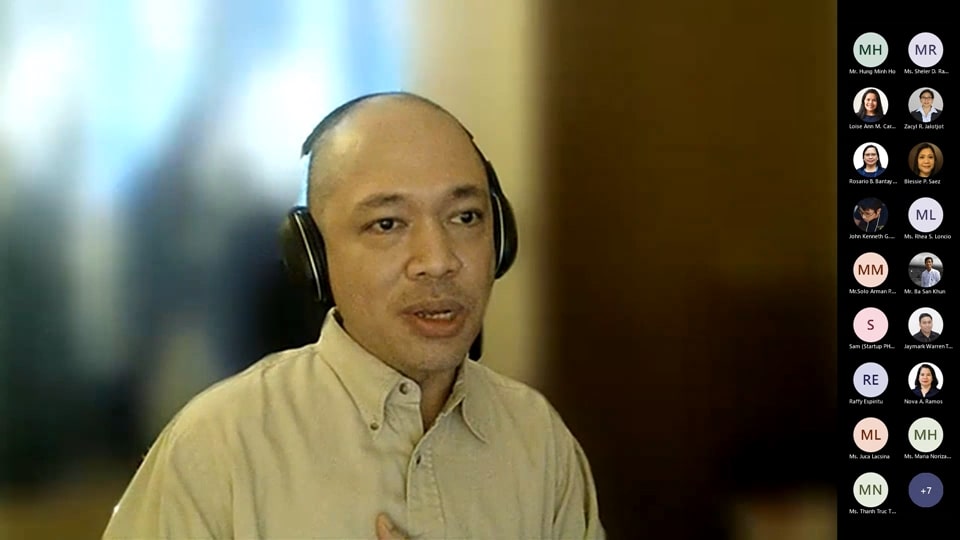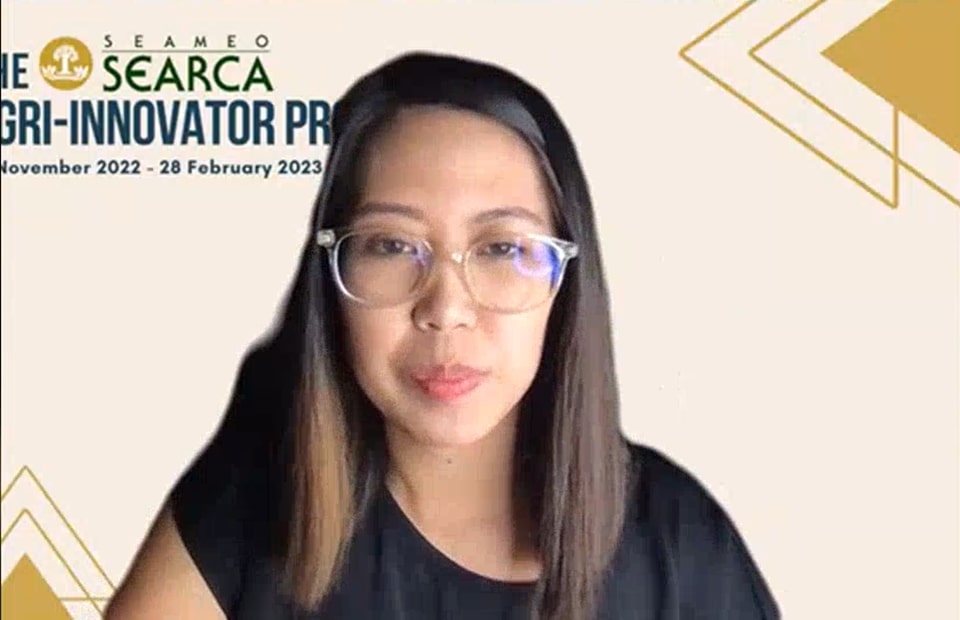In an era of change when the vulnerabilities, uncertainties, complexities, and ambiguities of a fast-evolving environment dictate the way agricultural challenges are appraised and addressed, how can agri-ventures and their innovations flourish in Agriculture 4.0?
The SEARCA Agri-Innovator Program (SEARCA AIP) contributes to responding to this question by advocating for a human-centered approach combining Design Thinking as a mindset and Lean Startup as a methodology for developing agricultural innovations. The short-term training program, formally launched on 22 November 2022 and will feature weekly sessions until 28 February 2023, brought together 16 agriculture and rural development practitioners from diverse backgrounds to walk them through the principles and processes involved in the program approach and methodology, with particular focus on designing and refining agri-innovation projects. Program participants included a mix of agri-entrepreneurs, representatives of farmer organizations and cooperatives, mid-level leaders, and staff of higher education institutions, government agencies, local government units, and nongovernment organizations from the Philippines, Vietnam, and Myanmar.
 Organizers, resource persons, and participants of the SEARCA Agri-Innovator Program pose for a group photo during the opening program.
Organizers, resource persons, and participants of the SEARCA Agri-Innovator Program pose for a group photo during the opening program.
SEARCA AIP aims to capacitate agricultural and rural development practitioners to succeed in innovation by adopting a human-centered approach to solving problems and developing new or improved products, services, processes, or ventures within their constituencies. Specifically, it seeks to equip the participants to embrace and advocate for Agriculture 4.0 and minimize intimidation by technology.
In his welcome message, Assoc. Prof. Joselito G. Florendo, SEARCA Deputy Director for Administration, emphasized that SEARCA AIP’s conception of innovation goes beyond technology development to adopt unique and more comprehensive solutions to the challenges faced by a specific node in the agri-value chain, ensuring that these solutions involve social, organizational, and institutional processes in overcoming the challenges identified.
 On behalf of SEARCA Director Dr. Glenn B. Gregorio, Assoc. Prof. Joselito G. Florendo, SEARCA Deputy Director for Administration, welcomes the participants to the SEARCA Agri-Innovator Program.
On behalf of SEARCA Director Dr. Glenn B. Gregorio, Assoc. Prof. Joselito G. Florendo, SEARCA Deputy Director for Administration, welcomes the participants to the SEARCA Agri-Innovator Program.
Mr. Carlo Valencia, SEARCA AIP Technical Coordinator and Lead Coach, said that the project aims to help agriculture and rural development practitioners succeed in innovation by taking a customer-centric role and startup approach to innovation, as well as prepare them for Agriculture 4.0. From a learning perspective, Mr. Valencia said that by the end of the program, participants are expected to be able to perform and advocate for human-centered techniques, namely, empathizing with their beneficiaries, clearly defining problems worth solving, and prototyping, testing, and iterating on their ideas.
 Mr. Carlo Valencia explains Design Thinking as the underlying framework of the SEARCA AIP.
Mr. Carlo Valencia explains Design Thinking as the underlying framework of the SEARCA AIP.
In her keynote speech, Ms. Juca Lacsina, President and CEO of GoEdenPH, shared her insights and experiences on establishing an agricultural startup from idea to execution, as well as the value of business tools. GoEdenPH is a one-stop e-commerce platform for agricultural inputs, supplies, and services that aims to consolidate fragmented supply chains for more efficient delivery of agricultural supplies and services to farming communities. Ms. Lacsina shared how design thinking and the customer journey mapping in creating persona was helpful for GoEdenPH, especially in prioritizing customer segments, identifying customer pains and gains, and obtaining a better understanding of their digital readiness.
 Ms. Juca Lacsina delivers her keynote speech, the lessons learned from applying design thinking and customer journey mapping in the context of agricultural startups.
Ms. Juca Lacsina delivers her keynote speech, the lessons learned from applying design thinking and customer journey mapping in the context of agricultural startups.
The program is structured into two modules that employ an experiments-based iterative approach. Module 1 on Agri-Innovation Idea Generation spans six sessions covering such topics as running empathy and problem interviews, creating personas and journey maps, solution research, and LoFi prototyping. This module focuses on learning the principles of successful innovation by applying them in the real world and will culminate in a presentation of the participants’ findings. Module 2, which deals with Agri-Innovation Idea Validation, builds on the previous module and provides opportunities for the participants to learn how to implement an iterative approach to further develop their ideas. Module 2 is also divided into six sessions composed mostly of synchronous coaching sessions discussing topics that include preselling and prototyping, building a minimum viable product, concierge testing, HiFi prototyping, usability testing, and the five-minute pitch.